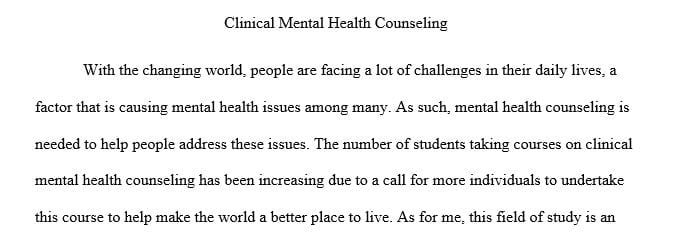Address your past and current helping experiences your future goals in the field of clinical mental health counseling
• In 1,000-1,200 words typed and double-spaced, address your past and current helping experiences, your future goals in the field of clinical mental health counseling, and your personal qualities that will enable you to be an effective counselor.
• Please also address how your interests and goals match the mission of Liberty University and the Master of Arts in Clinical Mental Health Counseling degree program. Please see the program handbook for the department’s mission statement.
This statement must also indicate that you have read and agree with the Department of Counselor Education and Family Studies Master of Arts in Clinical Mental Health Counseling Mission Statement and Diversity Statement.
2.2 Mission The mission of the Department of Counselor Education and Family Studies is to produce ethically and spiritually aware mental health counselors who possess the knowledge, values, skills, and personal disposition to promote the mental health and holistic wellness of clients across diverse populations. The CEFS purpose is to accomplish this mission by the professional development of the mental health counseling student across the following domains: 1) Attainment of scholastic competence in all coursework, 2) Acquisition of, and ability to apply counseling skills with a diverse population to a standard acceptable by licensed professional counselors, 3) Demonstration of emotional and mental stability and maturity in interaction with others, including the ability to maintain healthy boundaries, communicate appropriately, successfully manage personal anxiety or uncomfortable feelings, work collaboratively with others and resolve interpersonal conflict 4) Adherence to the Professional Identity and Standards outlined by the American Counseling Association’s Code of Ethics and Liberty Graduate Student Code of Honor, and 5) Demonstration of the ability to integrate faith and spirituality into counseling where appropriate in an ethically competent manner
2.3 Purpose Consistent with the University’s mission to develop “Christ-centered men and women with the values, knowledge, and skills essential to impact the world,” the Department of Counselor Education and Family Studies seeks to educate the whole person within a framework of grace and truth, which are core values exemplified in the life of Christ and necessary for professional service; developing the knowledge, values, skills, and personal disposition necessary for effective professional service. Our mission is achieved, in significant measure, through offering rigorous academic programs, dynamic interaction with mentors, faculty, and carefully structured practicum and internships
2.4 Commitment to Diversity Liberty University is a school founded upon fundamental Christian values like grace, truth, and love for all persons. As believers in Christ, we must demonstrate our commitment to loving others (cf. Matthew 22:34-40; Mark 12:28-34; Luke 10:25-28). We approach Counseling as a profession that fosters holistic human growth and development in the cognitive, emotional, behavioral, relational, and spiritual domains of life. Our Counseling approach also supports the worth, dignity, potential, and uniqueness of others who are made in the image of God. This means for us that all persons possess dignity and worth because they are unique subjects of Divine Creation. Our vision is focused on nurturing an academic community of diverse people and ideas and assuring that diversity enhances academic excellence and individual growth. Our faculty and students are comprised of persons that represent various national, ethnic, spiritual, and denominational backgrounds. Learning to be respectful and appreciate other cultures will add to each student’s experience at Liberty. For that reason, we are committed to nurturing and training a diverse student body in an atmosphere of mutual respect and appreciation of differences. The CEFS provides an academic community for students, faculty, and staff to teach and learn from the experiences of others and to submit personal values and assumptions for reflection and critical examination. Student learning, professional, and personal growth occurs in a climate that encourages a deepened appreciation of differences. Therefore, we do not discriminate in our educational and counselor training programs on the basis of race, color, creed, religion, gender, age, national/ethnic origin, sexual orientation, and physical or mental disability. While recognizing the importance of all dimensions of diversity, as mentioned above, the CEFS adheres to the following initiatives: ● To increase, through recruitment and retention measures, the diverse representation of students, faculty, and staff; ● Promote the full implementation of professional standards of practice and multicultural counseling competencies across the curriculum and in specialized courses; ● To include issues of diversity throughout the instructional programs and professional development activities; ● To develop graduate assistantships opportunities to serve diverse student groups; ● To provide departmental opportunities for students and faculty to engage in the exchange of ideas and information related to diversity; and ● To maintain ongoing educational opportunities and equality of access to our academic community. ● To equip students to ethically utilize spirituality as a force for healing when and where appropriate.
Solution preview for the order on address your past and current helping experiences your future goals in the field of clinical mental health counseling
APA
1086 words
